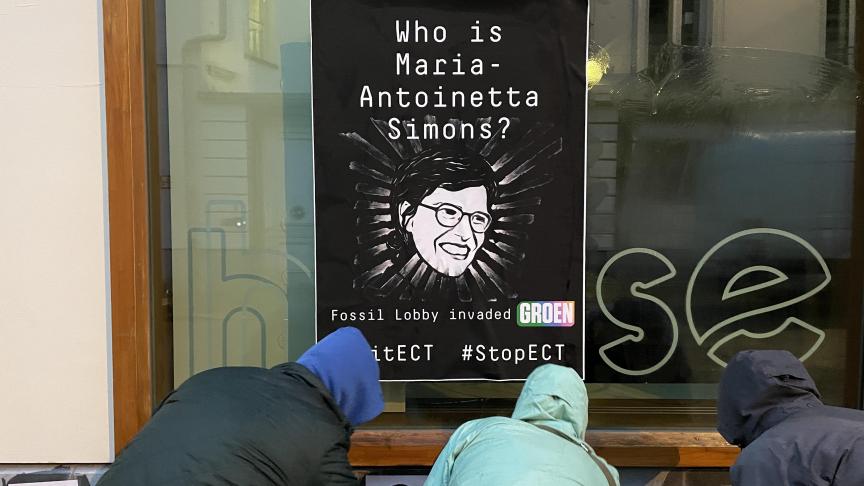Activists from the “Who is Maria-Antoinetta Simons?” collective covered the facade of the Flemish Green Party (Groen) headquarters in Brussels with posters on Monday morning, calling on Energy Minister Tinne Van der Straeten and her party to support Belgium’s withdrawal from the Energy Charter Treaty (ECT) – which they deem “scandalous” and “climaticide.”
The group’s protest comes before a crucial ECT conference on 22 November, which will decide the fate of the treaty, criticised for providing a legal shield to energy companies to protect their energy investments and take countries to court.
The name of the collective was chosen to denounce the alleged collusion between Minister Van der Straten and her foreign relations advisor, Maria-Antoinetta Simons, who worked for many years on behalf of the ECT, the activists say.
Camille, a member of the collective, denounced the relationship between the minister and the advisor as “incomprehensible.” According to the protestor, Simons’ inclusion in government represented a “conflict of interest.”
“We are calling on Minister van der Straeten to immediately exit the Energy Charter Treaty, regardless of what her adviser Maria-Antoinetta Simons thinks,” she added. The collective states that the treaty plays into the hands of multinationals and constitutes an “unacceptable brake” on the fight against climate change.
In response to the protest, a Groen spokesperson recalled that, together with the French-speaking Ecolo party, the party had made repeated calls for a rapid coordination of all EU Member States from the ECT.
“If the European Union really wants to play a leading role in the fight against the climate crisis, it cannot remain part of a treaty which protects investments harmful to the climate,” the co-presidents of the two green parties stated in June.
Related News
- Unethical sales tactics: Huge rise in complaints against energy suppliers
- COP27: Is the summit still fit for purpose?
Created in the 1990s, the ECT is criticised, above all, for the power it gives energy companies to sue states that may seek to put an end to fossil projects. The original idea of the agreement was to “protect investments,” but this text was later used as a weapon to protect fossil investments.
In October, Federal Climate Minister Zakia Khattabi stated that she was in favour of Belgium’s withdrawal from the ECT. However, it is unlikely that an agreement will be reached on Belgium’s withdrawal across all of the country’s federated entities.
Wallonia's Minister for Climate and Energy, Philippe Henry, said that the Walloon Parliament would likely abstain from the vote on the future of the ECT this month, due to the absence of a common, unified, position on the subject. Withdrawing from the agreement would need an accord between all of Belgium’s regions.

